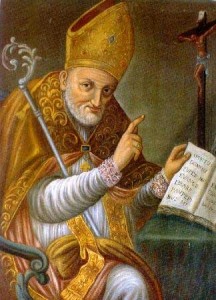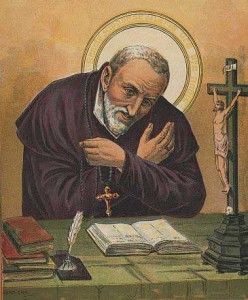USCCA27 Â Chapter 23 Â Life In Jesus part 2
[powerpress]
Archbishop Lucas offers insights on the US Catholic Catechism for Adults Chapter23:
The Understanding of Moral Acts
Another important foundation of Christian morality is the understanding of moral acts. Every moral act consists of three elements: the objective act (what we do), the subjective goal or intention (why we do the act), and the concrete situation or circumstances in which we perform the act (where, when, how, with whom, the consequences, etc.). For an individual act to be morally good, the object, or what we are doing, must be objectively good. Some acts, apart from the intention or reason for doing them, are always wrong because they go against a fundamental or basic human good that ought never to be compromised. Direct killing of the innocent, torture, and rape are examples of acts that are always wrong. Such acts are referred to as intrinsically evil acts, meaning that they are wrong in themselves, apart from the reason they are done or the circumstances surrounding them. The goal, end, or intention is the part of the moral act that lies within the person. For this reason, we say that the intention is the subjective element of the moral act. For an act to be morally good, one’s intention must be good. If we are motivated to do something by a bad intention—even something that is objectively good—our action is morally evil. It must also be recognized that a good intention cannot make a bad action (something intrinsically evil) good. We can never do something wrong or evil in order to bring about a good. This is the meaning of the saying, “the end does not justify the means†(cf. CCC, nos. 1749-1761).
United States Conference of Catholic Bishops (USCCB)
The Most Reverend George J. Lucas leads the Archdiocese of Omaha.Â
For other episodes in the visit our Archbishop George Lucas page
This programs is based on:
More information can be found here.
We wish to thank the USCCB for the permissions granted for use of  relevant material used in this series.
Also we wish to thank Matt Wilkom  for his vocal talents in this episode.
[ezcc]
Tags: acts, evil, Jesus, moral decision making, moral theology, morality, united states catholic catechism for adults, USCCB
This entry was posted on Monday, November 26th, 2012 at 7:45 am
You can follow any responses to this entry through the RSS 2.0 feed.
I always say a quick prayer to St. Alphonsus Ligouri before I go into the confessional. He is the great founder of the Redemptorists, and a  man who loved the Blessed Mother very much. His “Glories of Mary” is one of my favorite devotional books on the Blessed Virgin. He also wrote “Moral Theology”. He wrote it primarily based on his pastoral experience, as well as his education, which explains it’s ability to speak to us today. That pastoral experience, combined with his great prayer life, as well as his tremendous knowledge, made him such a wonderful confessor. What a heart this man had. He is a living example of how the journey can be made “from the head to the heart”. He is patron of Confessors and Theologians.
man who loved the Blessed Mother very much. His “Glories of Mary” is one of my favorite devotional books on the Blessed Virgin. He also wrote “Moral Theology”. He wrote it primarily based on his pastoral experience, as well as his education, which explains it’s ability to speak to us today. That pastoral experience, combined with his great prayer life, as well as his tremendous knowledge, made him such a wonderful confessor. What a heart this man had. He is a living example of how the journey can be made “from the head to the heart”. He is patron of Confessors and Theologians.
Petition to Mary by Saint Alphonsus Liguori
Most holy Virgin Immaculate, my Mother Mary,
to thee who art the Mother of my Lord,
the queen of the universe,
the advocate, the hope, the refuge of sinners,
I who am the most miserable of all sinners, have recourse this day.
I venerate thee, great queen,
and I thank thee for the many graces
thou has bestowed upon me even unto this day;
in particular for having delivered me from the hell
which I have so often deserved by my sins.
I love thee, most dear Lady;
and for the love I bear thee,
I promise to serve thee willingly forever
and to do what I can to make thee loved by others also.
I place in thee all my hopes for salvation;
accept me as thy servant
and shelter me under thy mantle,
thou who art the Mother of mercy.
And since thou art so powerful with God,
deliver me from all temptations,
or at least obtain for me the strength to overcome them until death.
From thee I implore a true love for Jesus Christ.
Through thee I hope to die a holy death.
My dear Mother,
by the love thou bearest to Almighty God,
I pray thee to assist me always,
but most of all at the last moment of my life.
Forsake me not then,
until thou shalt see me safe in heaven,
there to bless thee and sing of thy mercies through all eternity.
Such is my hope.
Amen.
Tags: blessed mother, confessor, glories of mary, moral theology, redemptorists, saint alphonsus
This entry was posted on Wednesday, August 1st, 2012 at 12:27 am
You can follow any responses to this entry through the RSS 2.0 feed.
VATICAN CITY, 30 MAR 2011 (VIS) – In this Wednesday’s general audience, celebrated in St Peter’s Square, the Pope spoke about St. Alphonsus Maria of Liguori, bishop, Doctor of the Church and “outstanding moral theologian and master of spiritual life”.“St. Alphonsus was born in 1696 to a rich and noble Neapolitan family”, and undertook a brilliant career as a lawyer, which he abandoned in order to become a priest in 1726.
The Holy Father explained that the saint “began his work of evangelisation and catechesis at the most humble levels of Neapolitan society, to whom he enjoyed preaching and whom he instructed in the basic truths of the faith”.
In 1732 he founded the religious congregation of the Holy Redeemer. Its members, “under the guidance of Alphonsus, were genuine itinerant missionaries, who travelled to the remotest villages exhorting conversion to the faith and perseverance in Christian life, above all by means of prayer”.
Benedict XVI recalled that St. Alphonsus died in 1787, was canonised in 1839 and declared a Doctor of the Church in 1871. This title was granted for a number of reasons. Firstly, for his valuable teachings in the field of moral theology, which accurately expressed Catholic doctrine and on account of which Pius XII proclaimed him as “patron of all confessors and moralists”.
“St. Alphonsus”, continued the Pope, “never tired of repeating that priests were a visible sign of the infinite mercy of God, Who pardons and illuminates the minds and hearts of sinners that they might convert and change their lives. In our age, in which there are clear signs of a loss of moral conscience and – it is necessary to note with some concern – a certain lack of respect for the Sacrament of Confession, the teaching of St. Alphonsus remains valid”. (more…)
Tags: doctor of the church, mercy of god, moral theologian, moral theology, sacrament of confession, st alphonsus, St. Alphonsus of Liguori
This entry was posted on Wednesday, August 1st, 2012 at 12:26 am
You can follow any responses to this entry through the RSS 2.0 feed.



